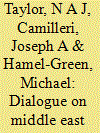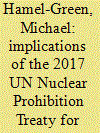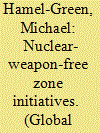|
|
|
Sort Order |
|
|
|
Items / Page
|
|
|
|
|
|
|
| Srl | Item |
| 1 |
ID:
117877


|
|
|
|
|
| Publication |
2013.
|
| Summary/Abstract |
Negotiations on the establishment of a Middle East zone free of biological, nuclear, and chemical weapons and their means of delivery are now at a critical phase after more than three decades of prenegotiations. This article examines the factors that have impeded negotiations in order to identify the key actors whose mutually reinforcing efforts are essential to its establishment. We argue that current efforts to negotiate a zone free of nuclear weapons and other weapons of mass destruction and their delivery systems (WMDFZ) in the Middle East can learn much from the successful negotiation of other nuclear weapons free zones (NWFZs). Nevertheless, the circumstances in the Middle East are unique and require a more holistic approach. Success here will depend largely on a multidimensional perspective that brings together the energies and insights of a range of state and nonstate actors, not least civil society in the Middle East, where confidence and trust building is too complex and demanding a task to be seen as the preserve of political and geostrategic calculation. Enabling the societies and polities of the region to identify areas of mistrust and misunderstanding across strategic, political, but also cultural and religious divides in order to open up possibilities for dialogue and mutual respect holds the key to creating a favorable negotiating environment.
|
|
|
|
|
|
|
|
|
|
|
|
|
|
|
|
| 2 |
ID:
161335


|
|
|
|
|
| Summary/Abstract |
The 2017 Nuclear Weapon Prohibition Treaty preamble reaffirmed the role of regional nuclear weapon free zones (NWFZs) in enhancing regional peace and security and in contributing to wider nuclear disarmament objectives. Existing such zones in many regions, including Latin America, South Pacific, Southeast Asia, Africa, Central Asia and Mongolia, have played significant roles in both preventing or reversing nuclear proliferation, assisting in the delegitimization of nuclear weapons as part of regional security arrangements, and securing binding negative security guarantees from nuclear weapon states (a feature absent in the NPT). At the same time, the new Prohibition Treaty contains important provisions that may require strengthening of existing NWFZs and consideration for incorporation in new such zones. The article examines particular needs for strengthening existing and proposed NWFZs, particularly in relation to the control over nuclear weapons, threats of nuclear weapon use, assistance in engaging in prohibited nuclear weapon activities, and obligations to provide victim assistance and environmental remediation in areas affected by nuclear testing.
|
|
|
|
|
|
|
|
|
|
|
|
|
|
|
|
| 3 |
ID:
090866


|
|
|
|
|
| Publication |
2009.
|
| Summary/Abstract |
The successful 2006 negotiation of the Central Asian Nuclear Weapon Free Zone (CANWFZ) Treaty indicates the continuing relevance of regional denuclearization measures as an important element in global non-proliferation strategies. Following on earlier nuclear-weapon-free zones in Latin America, the South Pacific, Southeast Asia and Africa, the CANWFZ is the first to be wholly located in the Northern hemisphere. Such zones face major challenges, including the existence of major regional conflicts, regional proliferation developments, lack of effective regional organizations in some regions for negotiating cooperative security arrangements, and difficulties in securing negative security guarantees from nuclear weapon states. Despite in-principle support to such zones, the nuclear powers, with the exception of China, have been highly selective in giving security guarantees to specific zones, with only two zones (Latin America and South Pacific) securing guarantees from most of the nuclear states. Nuclear weapon states are continuing to put their own military navigation, transit or deployment interests ahead of the non-proliferation benefits flowing from whole regions making binding agreements not to develop, acquire or possess nuclear weapons. New opportunities for nuclear-weapon-free zone establishment may be found in a return to multilateralist approaches with the advent of the US Obama Administration, current regional negotiations, and the role of middle level powers in mobilizing international support for nuclear-weapon-free zone initiatives, including further conferences of nuclear-weapon-free zone member countries. Proposed steps forward include: nuclear weapon state reviews of the current non-proliferation benefits of nuclear-weapon-free zones; commissioning of a new UN Experts' Study on nuclear-weapon-free zones; regional studies of the human, economic and climatic impact of nuclear war; and renewed regional nuclear-weapon-free zone efforts to establish new zones and strengthen existing zones.
|
|
|
|
|
|
|
|
|
|
|
|
|
|
|
|
| 4 |
ID:
127985


|
|
|
|
|
| Publication |
2011.
|
| Summary/Abstract |
One approach that forms part of wider global strategies to eliminate nuclear weapons is the
negotiation by groups or individual states on regional nuclear-weapon-free zones (NWFZs).
The zones do not supplant the need for negotiated, universally-applicable frameworks and
instruments-such as the Treaty on the Non-Proliferation of Nuclear Weapons (NPT) and the
Model Nuclear Weapons Convention-for dealing with nuclear threats, but they do serve to
gradually limit and delegitimize nuclear weapons at a regional level and to move towards a
nuclear-weapon-free world.
|
|
|
|
|
|
|
|
|
|
|
|
|
|
|
|
|
|
|
|
|